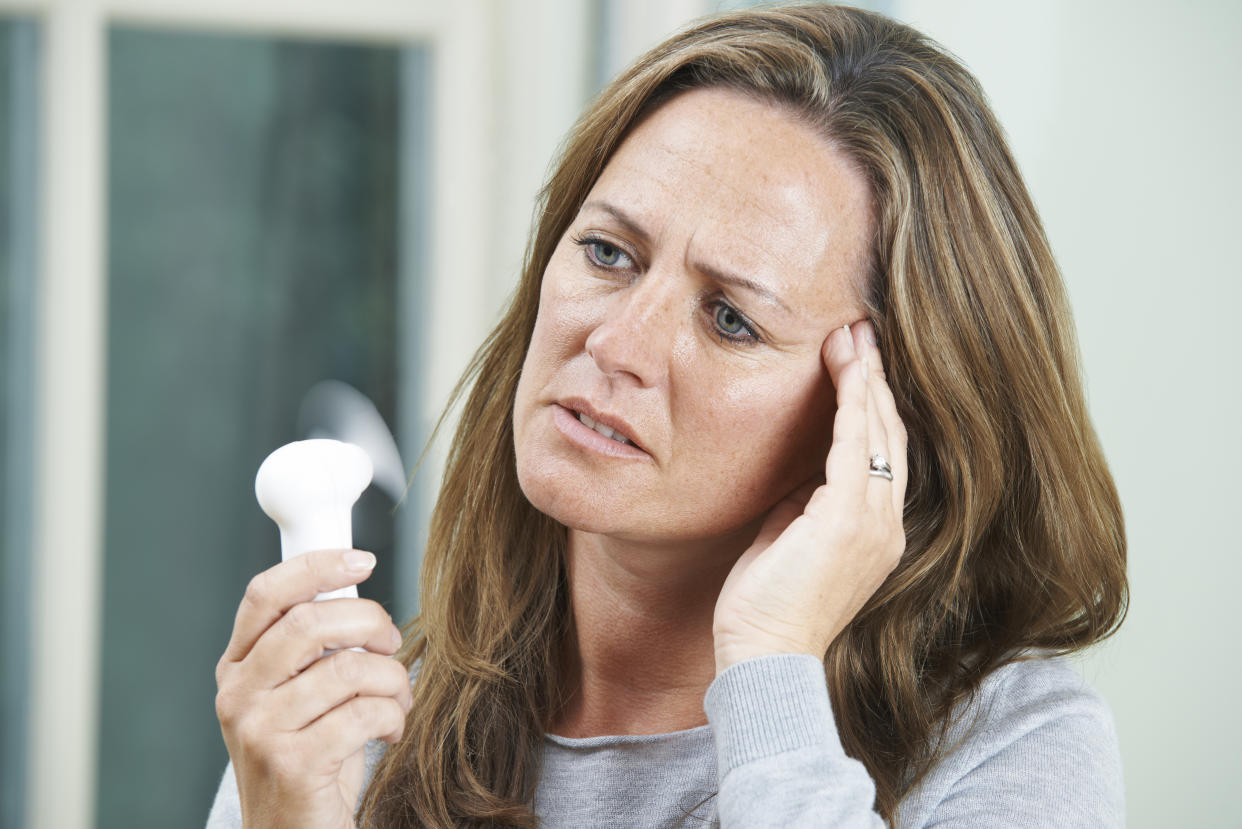‘Menopausal delay’ surgery that costs at least £6,000 has ‘no evidence’

A new procedure claims to delay a woman’s menopause by up to two decades.
The private clinic ProFam in Birmingham offers surgery that removes a “fraction” of a woman’s ovarian tissue while she is still young.
READ MORE: Vaginal dryness causes menopausal women to ‘give up on a sex life’, TV doctor warns
The menopause comes about due to falling levels of the hormone oestrogen, produced in the ovaries.
Young women can have a small piece of their “healthy” ovarian tissue removed and frozen.
As they approach “the change” in later life, the tissue is thawed and grafted into the body, reintroducing hormones that ward off the menopause.
ProFam claims the procedure allows women to “maintain their pre-menopausal state of health and wellbeing for an additional 10 or 20 years”.
Nine women are said to have had the operation, the BBC reported.
Critics argue there is “no evidence” the surgery, which costs at least £6,000 ($7,803), is effective at postponing the menopause.
READ MORE: Early menopause 'triples a woman's risk of multiple health issues'
“The change” occurs when a woman stops having periods and can no longer become pregnant naturally, according to the NHS.
A normal part of ageing, most go through it between the ages of 45 and 55, with 51 being average in the UK and US.
Falling oestrogen levels can trigger everything from hot flushes and night sweats to mood swings and insomnia.
Some turn to the controversial hormone replacement therapy (HRT) to help combat symptoms.
Although “extremely effective”, it has been linked to an increased risk of blood clots and breast cancer in some patients.
According to ProFam, women are living around 30-to-40 years after the menopause, leaving them with “decades of issues”.
When it comes to the age a woman should be when she has the procedure, it adds “the younger the better!”, with “only patients up to 40 years” being considered.
As they approach “the change”, their frozen ovarian tissue is thawed and grafted into an area with good blood supply, typically the armpit, the BBC reported.
The same procedure may also help women who prefer to become mothers later in life by “preserving the eggs”, ProFam claims.
Once a woman is ready to have a child, her thawed tissue can be reinserted near the fallopian tube.
READ MORE: Ulrika Jonsson shares relatable message about menopause
The brains behind the procedure admit it is experimental, but add freezing, storing and transplanting ovarian tissue has been going on for “over 20 years in patients who are at risk of losing their fertility due to cancer or benign disease”.
With the technology the same for delaying menopause, they add “we believe we are now in a position to offer the opportunity” to postpone “the change”.
Dr Melanie Davies, who chairs Fertility Preservation UK, cautions against “healthy women going through surgery that would not otherwise be needed...in the hope of preserving future fertility and hormone replacement”.
While similar approaches help restore fertility in some female cancer survivors “no healthy women have gone through this yet and there is no evidence that graft will last more than 10 years”, she said.
“It will be of limited help for hormone replacement”, Dr Davies added.
Dr Simon Fisher, founder and president of ProFam, called Dr Davies’ argument “rather strange”.
“When they [the women] went through the grafting (say after surviving cancer treatment) they were healthy, unless they had, say endometriosis and would we describe them as unhealthy?,” he told Yahoo UK.
“Stating that a graft could last up to 10 years is exactly our point as we plan to be able to do episodic, up to three, grafting procedures if needed.
“So even if the graft lasted five years that could be 15 years of hormonal replacement.”
According to ProFam, there is a 5%-to-10% risk the “tissue will not survive after transferring it back”.
It adds, however, “much of this information is based on patients who already had health risks; not young, healthy patients”.
Dr Davies urges women hoping to have a baby later in life to consider egg freezing rather than this “unproven technique”.
Dr Fisher argued claiming egg freezing is a “far better established procedure” is “disingenuous”.
“Established research has demonstrated the procedure requires at least 20 eggs in bank, which often means two-to-three rounds of the procedure, that requires hormonal stimulation then two-to-three egg recovery procedures,” he said.
“So neither cheap or non-invasive compared to ovarian tissue freezing that does not require up to two weeks of hormone injections before egg retrieval.”
Removing part of the ovaries could in theory trigger “the change”, however, ProFam claims even taking out a whole ovary “did not reveal any significant increase in the risk of early menopause” in “large studies”.
HRT aside, the NHS recommends women cope with hot flushes and night sweats by wearing light clothes, keeping the house cool, having a cold shower, using fans and avoiding triggers, like spicy food.
Mood changes can be eased via exercise, therapy or medication.
Find out more about the menopause and its treatments on the NHS’ website.


